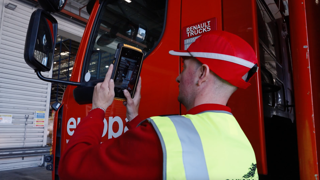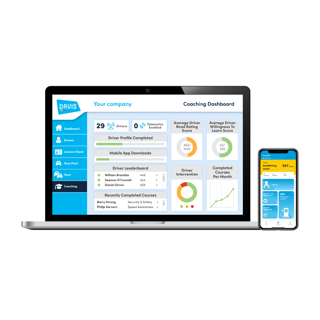Almost half (46%) of van and truck drivers say they have considered quitting in the past year due to work-related stress, dangerous roads and a lack of employer support.
The mental health crisis is unfolding alongside a sharp decline in perceived road safety, with a general feeling among van and truck drivers that roads have become more dangerous since the Covid-19 pandemic.
A massive 97% say the risk of driving accidents has increased over the last five years, citing dangerous behaviour by other road users — including poor driving (44%), speeding (38%), and mobile phone use behind the wheel (36%).
Geotab surveyed 3,501 commercial vehicle drivers across France, Germany, Ireland, Italy, the Netherlands, Spain and the UK in April this year.
Almost all of them agreed (95%) that the risk of accidents has increased since the pandemic, with 61% reporting this increase as ‘very’ or ‘quite significant’.
The vast majority (91%) of commercial vehicle drivers say that work-related stress has a negative impact on their driving, while 70% say that stress is a contributing factor to increased dangers on the road.
Significant work pressures appear to contribute to this stress. Half of the drivers surveyed (46% in the UK) admitted feeling the need to regularly break speed limits to complete jobs on time, while two-thirds (61% UK) stated that excessive traffic or roadworks make completing their jobs difficult.
When asked about the most regularly noticed dangerous behaviours, ‘poor driving by others’ found its highest percentage in the UK (44%), while ‘other drivers on their mobile phones’ was at its highest in Italy (59%) and ‘other vehicles driving too fast’ reached the biggest percentage in Spain (45%).
‘Cyclists endangering their own life’ was at its lowest across Europe in the UK at 19%, with the highest in Germany (36%).
“These results are a stark reminder of the pressures faced by commercial drivers, impacting road safety for everyone,” said Edward Kulperger, senior vice president at Geotab EMEA.
“Europe’s economy relies heavily on commercial vehicle drivers, yet stress is pushing them out of the industry and putting road safety at risk.”
Unhappy drivers considering their options
Against the backdrop of increased dangers and work pressures, drivers feel unsupported by their employers.
More than half (55%) feel uncomfortable approaching their employer for support with stress and other mental health concerns, coming in at 53% for the UK and rising to 66% in Ireland and 60% in Germany.
This is also reflected in over a third (37%) reporting their employer offering only a low or non-existent level of support, notably in Spain (50%) and Italy (44%), with 35% feeling this way in the UK.
As a result, almost half of UK respondents (46%) have considered quitting their jobs in the past 12 months (rising to 66% in Ireland and 58% in the Netherlands).
Kulperger said: “Drivers face significant work-related stress, observe dangerous behaviours daily, and are often pressured by schedules, yet many feel unsupported or uncomfortable seeking help.
“With nearly half thinking about quitting - and that amidst a driver shortage - it is crucial for employers to provide better mental health support now.”
Using technology for good

Looking forward, two-thirds (67%) of UK drivers support adopting technology to enhance driving performance.
“As an industry, we must prioritise driver wellbeing, employing data and technology not just for efficiency, but to proactively create safer, less stressful environments,” Kulperger added.
Addressing these challenges is crucial for driver wellbeing and fleet efficiency. Prioritising safety helps reduce accidents, lowering insurance, repair, and downtime costs.
Implementing robust safety programmes, supported by telematics data and cutting-edge AI models, allows proactive interventions.
By pinpointing risks, coaching safer behaviours, and monitoring wellbeing indicators, fleets can enhance safety, improve productivity, and achieve significant cost savings, leveraging the technology drivers are willing to adopt.
Find out from Fleet News how to improve your driver health and well-being.






















Login to comment
Comments
No comments have been made yet.